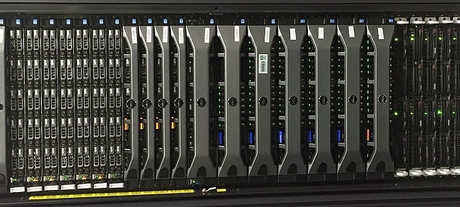New supercomputer for computational physics

The study of gravitational waves is one of a number of research areas that will benefit from ‘Pople’, a high-performance computing (HPC) cluster that is the latest addition to the Faculty of Science at The University of Western Australia (UWA).
The head of the computational chemistry lab at UWA’s School of Chemistry and Biochemistry, Dr Amir Karton, said the new supercomputer will support advanced research in computational physics, as well as chemistry and biology.
“[Pople], for example, will be used for conducting multiscale simulations of biochemical processes, studying gravitational waves and simulating combustion processes which generate compounds important for seed germination,” said Dr Karton.
“Such research could have been previously carried out only on national supercomputers, now these capabilities are accessible to any researcher in the faculty.”
Dean Taylor, the faculty’s systems administrator, said the supercomputer comprises 2316 cores in the compute nodes — 7.8 TB of main memory and 153 TB of local scratch disk — and was specifically designed for carrying out large-memory and data-intensive applications involved in computational chemistry, biology, physics and ‘big data’ research.
“For this purpose it contains compute nodes with up to 512 GB of RAM and large solid-state disks,” said Taylor.
He said a large portion of the Intel Xeon CPUs (1896 cores) were from a donation by Perth-based geoscience company DownUnder GeoSolutions.
DownUnder GeoSolutions’ managing director, Dr Matthew Lamont, said it was the company’s way of “investing in the future”.
“We’re thrilled to be able to give back to a university that has contributed greatly to the fields of science and geophysics,” he said.
Encrypted apps, AI, and cloud surveillance in policing
How Australia and New Zealand will be using technology to fight crime in 2026.
AI policy needs to protect future Australians
The genie is out of the bottle with AI and it's clear what corporate leaders are using their...
Agentic AI could be Australia's productivity superpower if we seize it
Government agencies have an opportunity to lead by example and embrace AI technology to solve...




